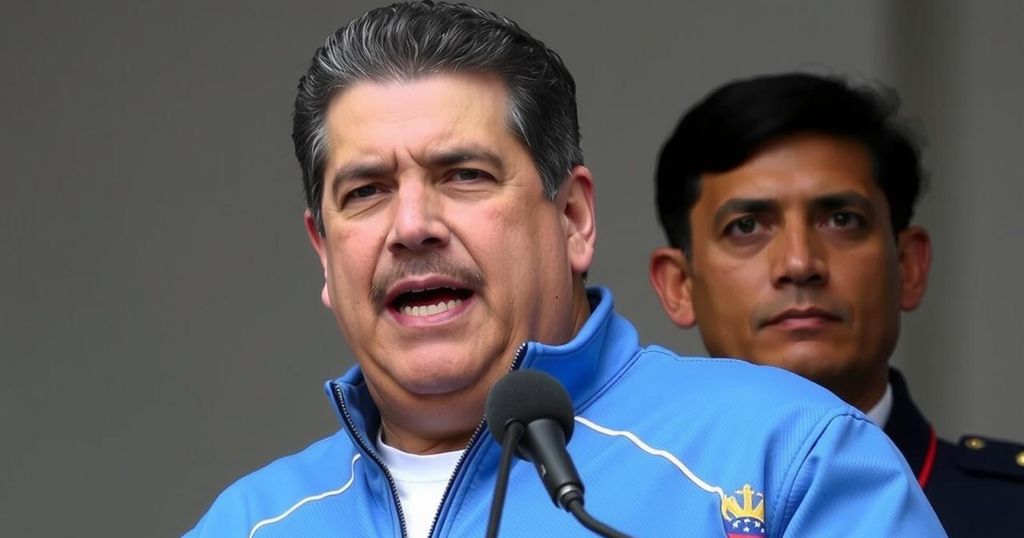Maduro Inaugurates Third Term Amid Election Controversies and Crisis in Venezuela

Nicolás Maduro is set to begin his third term on January 10 amidst controversies over last year’s election, which is widely viewed as fraudulent. Opposing candidate Edmundo González is recognized by the U.S. as the legitimate president, while mass protests against Maduro’s inauguration are being anticipated despite recent crackdowns on dissent. The Trump administration’s future approach to Venezuela remains a topic of speculation as the region grapples with ongoing humanitarian and security crises.
Nicolás Maduro is set to begin his third six-year term as President of Venezuela on January 10, amidst widespread doubts regarding the legitimacy of his previous election victory claimed on July 28, 2022. The ruling party-dominated congress will facilitate the swearing-in ceremony despite a growing chorus of national and international voices questioning the fairness of the electoral process. Opposition candidate Edmundo González, widely believed to have secured a decisive win, has garnered support for his claim from the U.S.-based Carter Center, which confirmed the validity of the opposition’s tally sheets.
Jason Marczak, Vice President and Senior Director at the Atlantic Council’s Adrienne Arsht Latin America Center, remarked that “Maduro assuming another term on Friday is a blatant violation of the votes of the Venezuelan people. The published tally sheets back that up.” His inauguration will enable Maduro to reinforce a governance style that has contributed to Venezuela’s chronic issues such as cronyism, rampant inflation, and severe food shortages.
Opposition forces have called for mass protests ahead of Maduro’s inauguration; however, a stringent crackdown which led to over 2,000 arrests has created an atmosphere fraught with intimidation, potentially dampening public dissent. María Corina Machado, a prominent opposition figure, intends to re-enter the political arena following a period spent in hiding, striving for a final effort to oppose Maduro’s administration.
Edmundo González, endorsed by the United States as the legitimately elected president, has faced persecution and was compelled to flee to Spain after the Venezuelan authorities issued a warrant for his arrest. During his recent international engagements, González met with President Biden, conversing positively about their discussions, while simultaneously contending with threats from the Maduro government, which has placed a $100,000 bounty for information regarding his location.
In light of these developments, the relationship dynamics between the Maduro regime and a potential second Trump administration are under scrutiny. Trump had previously been a staunch critic of Maduro; however, recent gestures from Maduro toward Trump suggest a willingness to engage in more conciliatory dialogues. Isaias Medina III, a former Venezuelan diplomat, cautioned that the liberation of Venezuela should remain the focus of any negotiations, emphasizing the serious threats posed by the regime to international security.
As the Trump administration prepares to take shape, analysts express uncertainty regarding the willingness to revert to a stringent ‘maximum pressure’ strategy regarding Venezuela, particularly with the pressing refugee issue stemming from the ongoing crisis. The incoming administration is likely to adopt an adapted policy approach, considering past experiences while continuing to uphold support for Venezuela’s opposition.
The Maduro government’s abduction of foreign nationals, including Americans, for potential leverage represents a troubling tactic as these impending political changes unfold. The charges labeled against these individuals typically involve espionage or terrorism, indicating a strategy focused on using human rights violations as bargaining tools.
With tensions still mounting, Venezuela’s political landscape remains precarious and imbued with uncertainty. Historically troubled under Maduro’s rule, the country’s future hinges on both internal resistance and international pressure to restore democratic norms and address the humanitarian crisis afflicting millions.
Venezuela has been embroiled in political turmoil since Nicolás Maduro assumed power more than a decade ago. His governance has been characterized by accusations of cronyism, economic mismanagement, and human rights violations. The political landscape saw an escalation after a contested election in which opposition forces asserted widespread electoral fraud. The implications of Maduro’s administration have led to severe socioeconomic issues, pushing millions of citizens to flee the country. As Maduro prepares for another term, the reaction from both domestic elements and international actors will be crucial in determining Venezuela’s path moving forward.
In conclusion, Nicolás Maduro’s anticipation of a third term amid significant allegations of electoral fraud underscores the friction within Venezuela’s political system. The discontent among the populace, coupled with the challenges posed by the international community, sets the stage for potential civil unrest and greater pressure on Maduro’s administration. With leaders like Edmundo González advocating for democratic restoration, and the Trump administration’s pending policy approach, the future of Venezuela’s governance remains uncertain yet critical. Continued scrutiny and advocacy from opposition parties, alongside international support, may play a determining role in shaping the nation’s trajectory.
Original Source: www.foxnews.com








